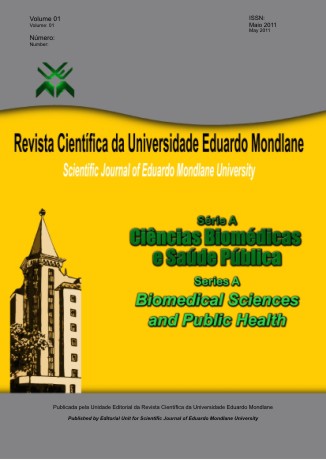IMPLICAÇÕES DE SUPORTE DE INICIATIVAS DE SAÚDE GLOBAIS NO SISTEMA DE SAÚDE DE MOÇAMBIQUE
Resumo
Mais de 70% do suporte financeiro ao sistema de saúde de Moçambique provém de parceiros de saúde internacionais. Durante a última década, apoio substancial foi alocado através das Iniciativas de Saúde Globais. Porém, as implicações concretas dessas Iniciativas sobre o sistema nacional de saúde não são conhecidas, daí a necessidade de se analizar, como objectivo, as implicações das Iniciativas de Saúde Globais para o Sistema Nacional de Saúde. Baseando-se em métodos qualitativos, entre Março de 2007 a Maio de 2011, 26 gestores seniores de saúde ao nível nacional e 66 gestores e provedores de saúde de Gaza, Zambézia e Nampula foram entrevistados. Também foi conduzida análise de documentos que relatam o contexto do sector de saúde nacional, políticas, grau de implementação e o papel da ajuda internacional. Como resultados, nos últimos anos, os Programas de Saúde foram impulsionados por fundos destas Iniciativas e assim o volume de actividades de controlo de doenças seleccionadas aumentou de forma marcante. Apesar deste aumento, o Sistema Nacional de Saúde ainda permanece pobre em muitos aspectos (infra-estruturas, pessoal qualificado, monitoria e avaliação, sistemas de informação de saúde, entre outros). Muitas Organizações Não-Governamentais apoiadas pelas Iniciativas de Saúde Globais continuam a atrair o pessoal de saúde pública qualificado, contribuindo para enfraquecer o sistema e induzem a geo-discrepância e iniquidades para além de tornar ineficazes os sistemas de monitoria e avaliação. O Ministério da Saúde ainda joga um papel marginal em termos de gestão e controlo dos fundos e, portanto, a execução dos planos estratégicos existentes é repleto de incertezas, situação agravada pela imprevisibilidade dos desembolsos prometidos. Muito recentemente, algumas destas iniciativas mudaram seu foco passando a apoiar no fortaleciemento do sistema de saúde, mas o impacto destes esforços só será visível a longo prazo. A ênfase exagerada de suporte no controlo de doenças seleccionadas limita a abordagem de integração para a saúde da população. Recomenda-se que Iniciativas de Saúde Globais devem basear-se em compromissos de longo prazo e apoiarem abordagens que estão em consonância com o Compacto de Parceria para Saúde que centra-se no fortalecimento do Sistema Nacional de Saúde como um todo.
Referências
BRUGHA, R. Global Health Initiatives and Public Health Policy. International Encyclopaedia of Public Health, 2008.
CAMPBELL, J.; STILWELL, B. Mozambique: taking forward action on Human Resources for Health (HRH) with DFID/OGAC and other partners, 2008.
CAR, J. et al. Negative health system effects of Global Fund’s investments in AIDS, tuberculosis and malaria from 2002 to 2009: systematic review. Journal of the Royal Society of Medicine Short Reports, v. 70, 2012.
CASSELS, A.; JANOVSKY, K. 1998. Better Health in Developing Countries: are Sector-Wide Approaches the Way of the Future? Lancet, n. 352, p. 1777-1779, 1998.
CHILUNDO, B. Integrating Information Systems of Disease-Specific Health Programmes in Low Income Countries: the case study of Mozambique. Oslo: University of Oslo, 2004 (PhD Thesis, University of Oslo).
CHILUNDO, B.; AANESTAD, M. Negotiating Multiple Rationalities in the Process of Integrating the Information Systems of Disease-Specific Health Programmes. The Electronic Journal on Information Systems in Developing Countries, v. 20, p. 1-28, 2004.
CHILUNDO, B. et al. Multi-Country Evaluation Study Health Impact of the Scale-up to Fight AIDS, TB and Malaria with special reference to the Global Fund: Final Country Impact Evaluation Report - MOZAMBIQUE. Maputo: Faculty of Medicine. University Eduardo Mondlane, 2008.
CHILUNDO, B. et al. Global Health Initiatives and Donor Harmonization Efforts in Mozambique: a review of official and grey documents. GHIs in Africa, 2007.
COLLINS, C. D.; GREEN, A. T.; NEWEL, J. N. The Relationship Between Disease Control Strategies and Health System Development: the case of TB. Health Policy. Elsevier Science, v. 62, p. 141-160, 2002.
GRUPO INFORMAL DE GOVERNAÇÃO E ALIANÇA 2015. 2010. Transparência da ajuda externa e do orçamento em Moçambique: constrangimentos para a sociedade civil, a assembleia e o governo. Maputo: Grupo Informal de Governação e Aliança 2015, 2010. Available: http://www.trocaire.org/sites/trocaire/files/pdfs/policy/Transparencia%20_Ajuda_Orcamento_Moz_2010.pdf . Accessed: 7 de Outubro 2011.
HUTTON, G. 2002. Issues in Integration of Vertical Health Programmes into Sector-Wide Approaches [Online]. Swiss: Swiss Tropical Institute, 2002. Available: www.sti.ch/scih/swap.htm. Accessed: 20th March 2003.
MACRO INTERNATIONAL INC., WORLD HEALTH ORGANIZATION, JOHNS HOPKINS BLOOMBERG SCHOOL OF PUBLIC HEALTH, HARVARD UNIVERSITY SCHOOL OF PUBLIC & AFRICAN POPULATION AND HEALTH RESEARCH CENTER. Multi-Country Evaluation Study - Health Impact of the Scale-up to Fight AIDS, TB and Malaria with special reference to the Global Fund: Final Country Impact Evaluation Report MOZAMBIQUE. Maputo: UEM-FM-Departamento de Saúde da Comunidade, 2008.
MOÇAMBIQUE. MISAU. Plano Nacional de Desenvolvimento dos Recursos Humanos da Saúde (PNDRHS) 2008 - 2015. Maputo, 2008.
OLIVEIRA-CRUZ, V.; KUROWSKI, C.; MILLS, A. Delivery of Priority Health Services: Searching for Synergies within the Vertical versus Horizontal Debate. Journal of International Development, v. 15, p. 67-86, 2003.
PEOPLE'S HEALTH MOVEMENT, MEDACT, HEALTH ACTION INTERNATIONAL, MEDICO INTERNATIONAL & NETWORK, T. W. 2011. Global Health Watch. London: Palgrave Macmillan, 2011. (An Alternative World Health Report, 3).
UNDP 2011. Sustainability and Equity: A Better Future for All. New York, USA: United Nations Development Programme.
WALT, G.; PAVIGNANI, E.; GILSON, L.; BUSE, K. Health Sector Development: from aid coordination to resource management. Health Policy and Planning, v. 14, p. 207-218, 1999.
WHO. Stock taking Report for Mozambique: international health partnership and related initiatives (IHP+). Harmonization for Health in Africa (HHA). Inter-Regional Country Health Sector Teams’ Meeting. Lusaka, 2008.


